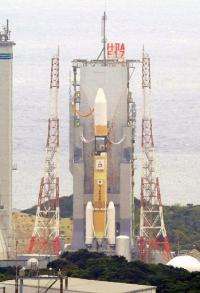Japan rocket to blast off with Venus probe and 'space yacht'

Japan was set to launch its first Venus probe Tuesday, using a rocket that will deploy an experimental "space yacht" propelled by solar particles bouncing off its kite-shaped sail.
The H-IIA rocket was positioned at the Tanegashima space centre in southern Japan in fair weather Monday for its lift-off the next day at 6:44 am (2144 GMT Monday), said the Japan Aerospace Exploration Agency (JAXA).
It will blast off with the "space yacht" Ikaros -- an acronym for Interplanetary Kite-craft Accelerated by Radiation of the Sun -- which moves thanks to the pressure of sunlight particles hitting its square sail.
Ikaros, which has cost 1.5 billion yen (16 million dollars) to develop, will be the first use of the technology in deep space, as past experiments have been limited to unfolding its sail in orbits around the Earth.
The experimental spacecraft's sail, thinner than a human hair, is also equipped with thin-film solar cells to generate electricity, creating what JAXA calls "a hybrid technology of electricity and pressure".
The technology could enable space travel without fuel as long as there is sunlight, its developers say.
JAXA plans to control the path of Ikaros by changing the angle at which sunlight particles bounce off the silver-coloured sail.
Ikaros will initially be a short cylindrical shape when it is released into space, when it will extend its sail, which measures 14 metres (46 feet) on each side and 20 metres diagonally.
Its name alludes to Icarus, the figure from Greek mythology who flew too close to the sun and fell into the sea, but a JAXA official has promised that "this Ikaros will not fly into the sun".
The H-IIA rocket -- Japan's primary space launch vehicle, developed by JAXA and manufactured by Mitsubishi Heavy Industries -- will also launch Japan's first satellite bound for Venus.
The Venus Climate Orbiter PLANET-C, nicknamed Akatsuki, which means "Dawn" in Japanese, will work closely with the Venus Express, a satellite sent earlier by the European Space Agency.
The box-shaped probe with two solar array paddles is expected to arrive at Venus in December and observe the planet in an elliptical orbit, from a distance of between 300 and 80,000 kilometres (186 to 49,600 miles).
Venus rotates around the sun like the Earth but is closer to the sun.
It is sometimes referred to as the Earth's sister planet because it is believed to have been born in a similar process to the Earth's formation about 4.6 billion years ago and is similar in size and mass.
But the planet has a far hotter climate, around 460 degrees Celsius (860 degrees Fahrenheit), with clouds of sulfuric acid and large amounts of carbon dioxide, which is also the primary greenhouse gas on Earth.
Scientists believe a probe of the climate of Venus will help them deepen their understanding of the formation of the Earth's environment and its future.
The H-IIA will also carry four other small satellites, developed by Japanese universities and other institutions.
(c) 2010 AFP


















